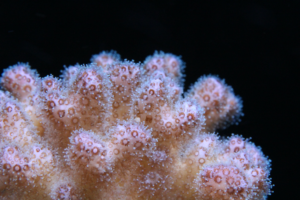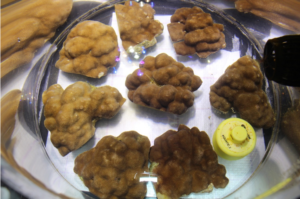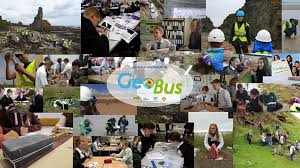Public Engagement: Climate Change, Coral and COVID-19
Dr Nicola Allison  has been a researcher at the University of St Andrews for twenty years. Throughout her career studying biomineralisation she has worked in many exciting places, such as Thailand or Hawaii. From exploring the past by delving into the chemistry of minerals to understanding the effects of future climate change, Nicola is ever inspired by the dynamic nature of her field.
has been a researcher at the University of St Andrews for twenty years. Throughout her career studying biomineralisation she has worked in many exciting places, such as Thailand or Hawaii. From exploring the past by delving into the chemistry of minerals to understanding the effects of future climate change, Nicola is ever inspired by the dynamic nature of her field.
Back in April, the 50th Anniversary of Earth Day was due to be celebrated through a multitude of activities and events, including a series of public lectures outlining the University’s plans and goals for practicing future sustainability. However, Covid-19 struck and sadly the day could not go ahead.
 Nicola had a role in planning some of the activities with a focus on ocean acidification, a consequence of climate change. The activity would involve students and the public alike holding coral skeletons from corals grown in different ocean acidification conditions recreated in the lab (see massive type Porites corals, left). In doing so, they would see for themselves the results of increasing levels of carbon dioxide dissolving in the world’s oceans.
Nicola had a role in planning some of the activities with a focus on ocean acidification, a consequence of climate change. The activity would involve students and the public alike holding coral skeletons from corals grown in different ocean acidification conditions recreated in the lab (see massive type Porites corals, left). In doing so, they would see for themselves the results of increasing levels of carbon dioxide dissolving in the world’s oceans.
Such a simple mode of Public engagement – a brief, captivating encounter with a visual prop – can bring to life the significance of the conveyed message more effectively than a long lecture, leaving the passer-by with something to ponder. This is exactly why Science Discovery Day (SDD) is so rewarding for those conducting short demonstrations to the bustle of energetic primary school children. Short, snappy and ‘hands-on’ insights into science can often be the most successful means of communicating a complex and crucial topic such as climate change whilst leaving the children enthralled.
The educational programme GeoBus, developed by the University’s Department of Earth and Environmental Sciences, utilises this interactive approach to teach children about Earth sciences. Since 2012, GeoBus has interacted with more than 75,000 students in over 250 different schools. GeoBus activities have regularly featured at SDD. Nicola has helped to develop some of the activities designed to make people stop and think about climate change. Indeed, Earth sciences as a field is best placed to highlight to the scientific community and to the public not only the problem of climate change for future generations but potential solutions.
Often researchers can struggle to find the time for Public engagement or be unsure as to how to sculpt their research into something accessible for a general audience. However, as highlighted by Nicola’s idea with the coral, it can be quick, straightforward and fun. Even simply sitting with a friend in a pub and explaining your research and its importance is a fundamental skill, especially if – like Nicola’s – it sheds light on something as topical as climate change.
Whilst the Covid-19 pandemic may currently seem like the be-all and end-all, it will end. However, climate change is not just a problem for here and now but for future generations –ultimately, the scientific basis of climate change must be effectively communicated to the public if the issue is to be addressed.
~ Blog post was interviewed and written by Freya Masters